 Home > CR Interviews
Home > CR Interviews CR Sunday Interview: Joe Decie
posted April 22, 2017
CR Sunday Interview: Joe Decie
posted April 22, 2017

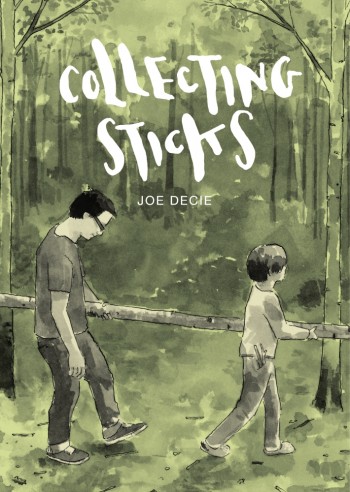 Joe Decie
Joe Decie makes quiet comics about smaller life moments, a gentle pushback against expectation that every story conform to bombast and rigid narrative structure. It helps that Decie brings a significant skill-set to the page when backing up his approach. He has a playwright's economy with wordplay, and a painter's sense for tone and feeling as derived from his wash-based visual style. I've read everything of his I think exists and will continue to do so for as long as I'm able. His latest,
Collecting Sticks, is a fine entry point into everything Decie does well.
I think the man might be nicer than the work, which in Decie's case is really saying something. -- Tom Spurgeon
*****
TOM SPURGEON: Joe, can I ask how a project like this comes together creatively? It reads like most of it was serialized. But beyond that, what factors play into your deciding that this series of instances would hold together as a story that you want published? Is there a crucial moment? Do you have to do any finessing to get there?
JOE DECIE: It wasn't ever serialized. But, you're right, I do think in short beats, I can't help it, I can't shake the single-page, or maybe the double-page beat. And, to be honest, I had no idea if this story held together as a story, beginning-middle-end, not until I'd shown it to a few people and they said it did. So we can blame them if it doesn't. [Spurgeon laughs]
The way I worked on this, I had notes, small events that had taken place on various camping trips, they were written down in notebooks, scraps of paper. Being used to working on short form stuff, I had to fight the urge to immediately draw up each instance as a single strip and post it online. I find that instant online posting quite gratifying. But no, Joe, you're doing a Big Book, getting paid to draw it, so I filed them away. I knew I was working on a story about a trip to the woods, so I saved every strip or idea that I thought could be used in this book.
Then, after a while, I sat down and sorted through it all. I pieced it together, as rough thumbnails, building bridges here and there, returning to themes. I didn't really want to have a crucial moment, you know, I wanted a story that just runs along, as most people's lives just run along. I wanted to reflect that a story can be good, good enough to tell, without crisis or peril.
I was worried that my editor would suddenly decide against this. They'd seen the whole thing as thumbnails, but I was worried. I like to worry. As it turned out, they did have some input, did make some changes and that was brilliant. They made me add an ending. Well, a second ending. And the book is so much better for it. I was really fearful about working with an editor, that they'd have their own vision that they'd want to stamp on the book. But no, of course not, they just wanted me to tell the story as best I could.
 SPURGEON: By second meeting do you mean the epilogue? Why do you think that works as an ending? I mean, I agree, I feel it kind of repeats for emphasis and thus gives the ending a weight, but I'm more interested in how you look at it. Why is the book better for that ending?
SPURGEON: By second meeting do you mean the epilogue? Why do you think that works as an ending? I mean, I agree, I feel it kind of repeats for emphasis and thus gives the ending a weight, but I'm more interested in how you look at it. Why is the book better for that ending?
DECIE: I liked the use of an epilogue because it brought the story literally and figuratively back home. It also allowed a pause via that extra title page. And I wanted conclusion to my obsessive worries earlier in the book. It adds that, but also shows that life goes on in the Decie household, compulsions and all.
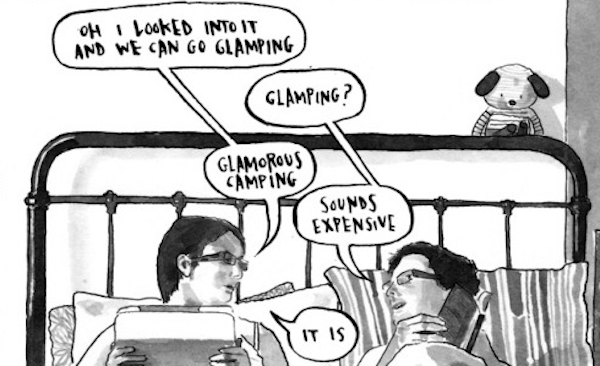 SPURGEON: Do you still feel there's legitimacy bias against short works? I know there's a perception that short-story collections sell poorly, which I think is related.
SPURGEON: Do you still feel there's legitimacy bias against short works? I know there's a perception that short-story collections sell poorly, which I think is related.
DECIE: I'd certainly say I've noticed a level of expectation that long form, or a Graphic Novel, was seen as progress from smaller pieces and mini comics. And for years it was something I kicked against. I had a ridiculous kind of reverse snobbery against the graphic novel compared to the small press and zine-making scenes. I think it was because, especially when I was starting out, there was a boom in graphic novels and I'd meet a lot of people who, having never drawn a comic before, were embarking on huge 300-page works. I saw that as a daft jump in the dark. [Spurgeon laughs] And I cringed at the term Graphic Novelist, so took pleasure in saying I was simply a cartoonist, who made comics; they're not dirty words. But of course I was being pedantic and these days I don't care what terms people use to call themselves or this craft.
It was kind of frustrating when publishers I'd have loved to have worked with would approach me saying they enjoyed my work and would I consider working on a longer form project, for the very reason that short stories didn't sell well enough. Financially I didn't have the time then to invest into seeing if I was capable of a long-form work, but I did so want to be published by one of the big guys.
The opportunity to work on
Collecting Sticks came about quite organically.
The Lakes Festival said they wanted to commission a short work from me. The short work turned into a long work and they suggested I look into additional funding to help the comic reach its full potential. That's when I applied to
the Arts Council for funding, who gave me a grant to work on the book and I was able to give the project time and get it drawn. I'm a slow drawer.
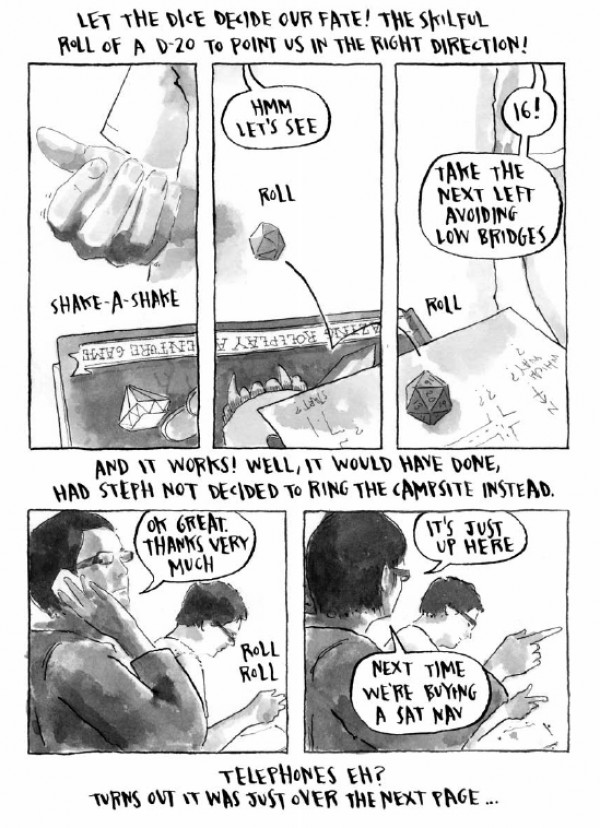 SPURGEON: Knowing what you do about North American comics publishing through your friends, how do you feel a book like this comes together in the business sense that's different than a US project? For instance, this is Jonathan Cape book, under Penguin, and i think of them as having a lot of resources, but it looks like you were assisted maybe up to three time in this project's conclusion. Is that routinely available to you, that kind of, say, help from a Lakes Festival? Does that lock you into a work earlier on than if there were one financial exchange, such as from a publisher?
SPURGEON: Knowing what you do about North American comics publishing through your friends, how do you feel a book like this comes together in the business sense that's different than a US project? For instance, this is Jonathan Cape book, under Penguin, and i think of them as having a lot of resources, but it looks like you were assisted maybe up to three time in this project's conclusion. Is that routinely available to you, that kind of, say, help from a Lakes Festival? Does that lock you into a work earlier on than if there were one financial exchange, such as from a publisher?
DECIE: Access to funding for comic artists is not usual. But a lot more artists are learning how to put in applications to the
Arts Council, for example. Unfortunately, it's not as simple as saying, "I'm drawing a comic, please give me some money to work on it." [Spurgeon laughs]
Understanding the language of the arts world is crucial. You need to talk about your practice and how the funding would help that, about your audience and the amount of people that will engage with the work... there's a whole lot of stuff they want to know before they give you any cash. But there is some money there for British cartoonists, if they can get through that application process. Of course, none of that is going to happen if you don't have a project ready to go. So, having grant money before I started the book gave me time to work on it full time. But a lot of ground work was needed before that. Would I be able to get grant money again? Maybe not.
SPURGEON: You have a graffiti background, which you described to Dan Berry as a world where you work a lot at home perfecting your craft before taking it out of doors. Comics doesn't have that kind of threshold expectation. Could comics learn anything from graffiti culture in a broad sense?
DECIE: Well I'm not sure how healthy it is, but hip-hop culture in general is all about competition and the battle. This very much pushes you to strive to be the best you can and if your work doesn't cut it, you'll know about it very quickly. I'd say, at least at the outset, comics is very different from that... your peers are mostly very encouraging and on the whole are not an overtly competitive bunch. But the comics gang could learn to give and receive criticism constructively. Perhaps that takes place face to face at comics
schools such as White River Junction etc? but I've never really experienced it in my online life. I'm not sure if competition is a good thing, but it probably doesn't hurt to try and up your game, to keep up with your peers.
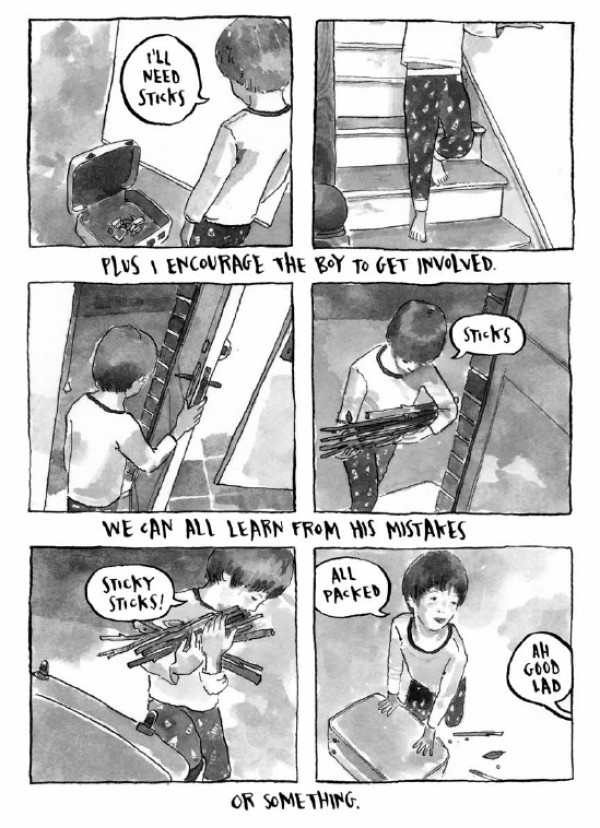 SPURGEON: You have a really striking lettering style, I would assume in part from that background. Lettering is a craft that's all over the place in comics, from specialized practitioners to folks that do their own, sometimes poorly. What could people learn from your experience about lettering? Is there one thing that bothers you over other things?
SPURGEON: You have a really striking lettering style, I would assume in part from that background. Lettering is a craft that's all over the place in comics, from specialized practitioners to folks that do their own, sometimes poorly. What could people learn from your experience about lettering? Is there one thing that bothers you over other things?
DECIE: I do love writing words, the form of a good S or lovely E. Gs are quite awkward though, eh? Gah, bad lettering irritates me no end. Comics are words and pictures, yet a whole heap of cartoonists put no effort into their lettering. Do I sound like a grumpy old man? I sound like a grumpy old man. I'm not demanding that everyone goes out and buys an
Ames Lettering Guide, life's too short, sure. But at least consider your writing, its legibility and how it fits with your drawing style and the page as a whole. I think the craft would be improved so much if we all put more care and thought into the calligraphy of comics. I've had comics I've not been able to finish reading as I can't get through the text. But maybe that's because I'm dyslexic rather than a lettering snob, or a bit of both.
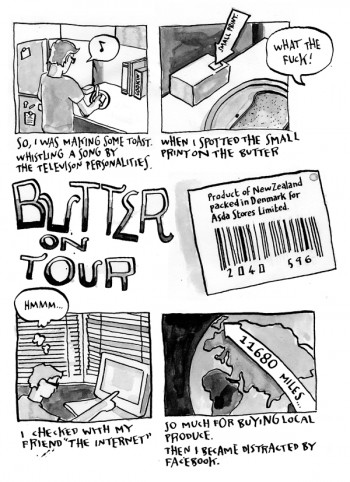 SPURGEON: Your tenth anniversary of making comics is next year. I've heard from friends that you're rough on older art, but beyond the fact you might think it's terrible, is there one thing you've learned and upon which you've improved? My take is that you're much, much, much better at staging your comics now, that you relied on a rigid camera effect early on and not a lot of figure-drawing. What do you feel is most different now?
SPURGEON: Your tenth anniversary of making comics is next year. I've heard from friends that you're rough on older art, but beyond the fact you might think it's terrible, is there one thing you've learned and upon which you've improved? My take is that you're much, much, much better at staging your comics now, that you relied on a rigid camera effect early on and not a lot of figure-drawing. What do you feel is most different now?
DECIE: It's true I'm my biggest critic, but you've got to be. My drawing has improved naturally, just putting in the hours does that, and it's not anything I've ever considered, sat and considered, looked at the page and thought, how could I do that better? I don't really play with how a panel or a page will be set up, I just have it there in my head and try to get that out on to the page. That's the tricky bit. But I guess, though persistence and a growing confidence in my ability, my pages have improved.
Writing, however, that's the big thing for me, I spend ages um-ing and ah-ing over the narration, getting the flow of words just right. I don't think I used to spend as long on that in the early days, when I was whacking out quick strips. But I should be clear, I still consider myself a beginner, I'm still in the early stages, learning.
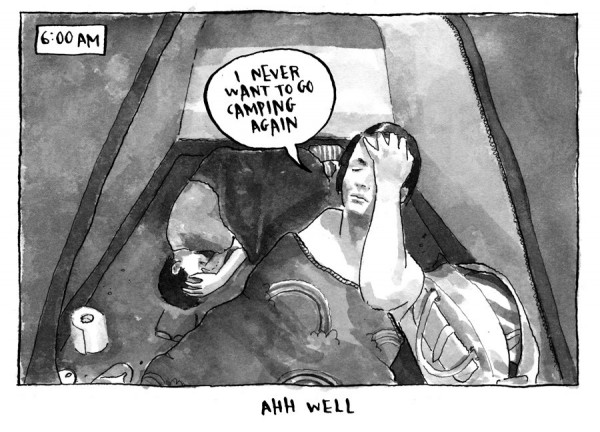 SPURGEON: Your narration and dialogue interests me because you're really terse and lean. It reminds me of theater, or the proscenium-style strips that draw from theater. Is this a personal preference, this kind of really pared-down approach? Does the way you draw, a recognizable people, influence the style of language you employ?
SPURGEON: Your narration and dialogue interests me because you're really terse and lean. It reminds me of theater, or the proscenium-style strips that draw from theater. Is this a personal preference, this kind of really pared-down approach? Does the way you draw, a recognizable people, influence the style of language you employ?
DECIE: Yeah, I try to keep it trim. I get really turned off by comics with reams and reams of text, I glaze over. So I edit, I boil it down as best I can. Is poetry a dirty word? I suppose they are poems of sort. The weight of words is important to me, the time the reader lingers on each word. I want to control the pace and keep it moving. Perhaps it's the equivalent of my telephone voice? a slightly altered, more considered version of my voice.
SPURGEON: Another thing about your tenth anniversary is that you're still working the single digits but those early years of your career is full of what seem like largely outdated terms: webcomics nation, livejournaling. Would you have found it easier or more difficult to get started today? Is there a specific way you were fortunate to have wiggled into comics the moment that you did?
DECIE: Back then it felt like a good time for forging friendships, building an audience, yes. I just drew and posted comics regularly and attended shows. That worked for me. It was brilliant that my peer group was world wide. Thanks to the internet I wasn't reliant on a monthly meet up in the room above a pub or on trading comics via the mail to get feedback on my work and to talk shop with like-minded folk.
But all that still exists, for every livejournal there's a twitter or Instagram or whatever. I think it's a brilliant time for young cartoonists to be starting out. There's a gang for everyone, you can find your people. I was probably fortunate that I fell in with such a good bunch -- a diverse bunch, too. It's lovely to go the comic shop and see so many of my friends represented. So many people found their voice, found an audience, found a publisher, or became that publisher.
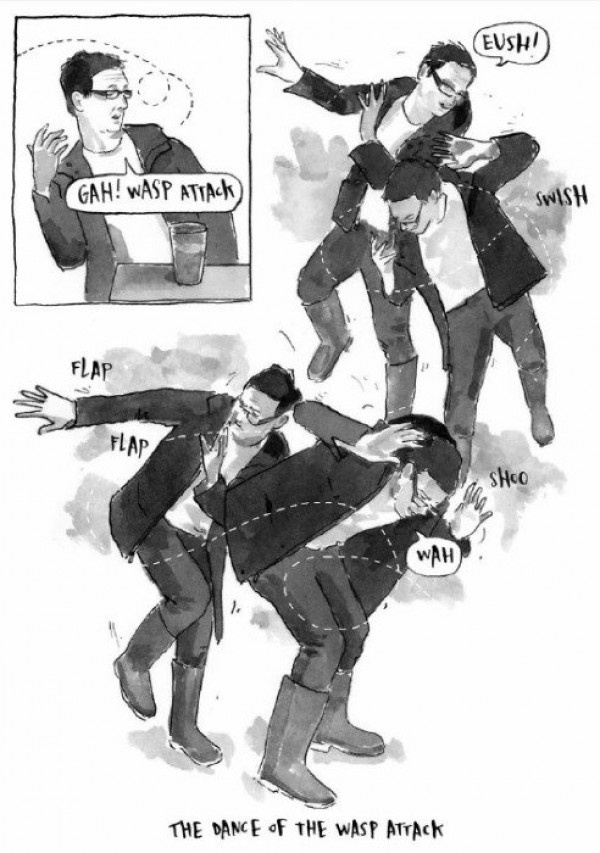 SPURGEON: What is the hardest part about establishing your creative voice when there are hundreds and hundreds of people vying for the same audience. What do you think of cartoonists that don't make it this far in terms of year, that just move in another direction. Are they missing out? Are they being smart?
SPURGEON: What is the hardest part about establishing your creative voice when there are hundreds and hundreds of people vying for the same audience. What do you think of cartoonists that don't make it this far in terms of year, that just move in another direction. Are they missing out? Are they being smart?
DECIE: I think it's best not to think about vying for an audience. When I draw, I'm speaking to a few friends, that's the way I visualize my audience. If I started thinking about how to broaden my appeal, I'd probably edit the good stuff out of my work. And I have no interest in looking at "what is popular" with an eye to winning over new readers. I see trends where people are all drawing the same, in a kind of safe, homogenized style, but that has no appeal for me. I'm sure it's fun to all work in the same visual language, but still.
As for the artists who have fallen by the wayside, yeah I guess some of them grew sick of staying up all night stapling comics only to sell five copies at the show the next day. You can't go on like that if you're not having fun.
And as for using comics as a stepping stone into other things... moving to LA to work on cartoons? or storyboards, preproduction and character design for your favorite films? Why the hell not? I would in no way hold a grudge against anyone using their skills in a different field, especially if it's a good field, or one that makes money. It's pretty difficult to make a living from drawing, get it where you can. That said, I do miss a lot of those folk and wish they'd drop in every now and then with a killer new mini to show us who's boss.
SPURGEON: Your basic mode of narrative, your basic point of view, seems to be "expectations constantly thwarted." There's a set up that seems perfectly logical as to how things might progress, they are punched in the kidneys by human behavior, but the end result is softened by a lack of stakes combined with the fact that their new direction is usually close to being as sensible as the old one. The kid is expected to be ready. The kid is naked and playing lego. Well, kids do that kind of thing, and he can get dressed now. Is that a fair representation of how your mind works, how you view the world? Is this simply an incredibly useful primary model? If something jarring happened, would it fit into your narratives?
DECIE: Well, it's autobiography, so let's hope nothing too jarring happens in my actual life and we don't need to find out. But, in truth, that's how I see life, things happen, sometimes not the way we plan, we deal with it, laugh about it. Or things don't happen, life is normal. I make things happen, silly things. That's kind of how I deal with the world, have fun, be daft, who gives a fuck. Of course, serious stuff does go on in my life but the stories I produce for those few friends I'm talking to, maybe down the pub, the stories I have for them aren't the ones where something bad is happening, they're about the good stuff, the funny stuff. Who knows, maybe one day I'll throw some serious shit into the mix. I deal with that stuff in the same way, maybe I'm flippant.
SPURGEON: Do you have a role-model for either the art or the writing? Can you talk about any of them? One might see John Porcellino, David Chelsea and any number of folks in there, but it could also be you coming to the same conclusions. Is there someone in your comics you see that no one else seems to?
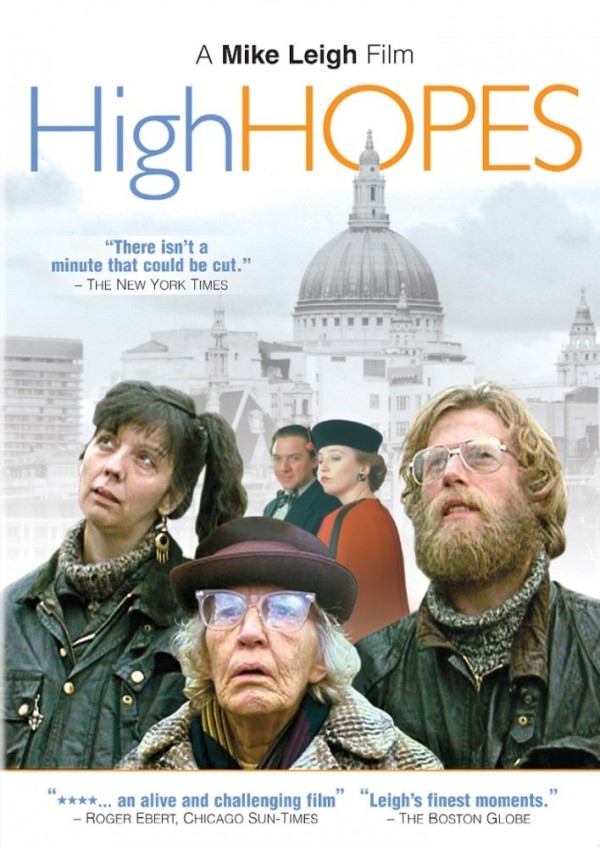
DECIE: Hmm, I don't think I have a role model like that, no. In fact, when people have mentioned someone I might be like, I tend to avoid them. In the early days it was
Eddie Campbell, so I made sure I didn't read any of Eddie's work so I couldn't be accused of biting his style. Ha! I admire John, sure, and I read his stuff, I love the quiet flow of his work. But I don't aspire to make his comics.
I wish I did have a role model for my art, I seem to have painted myself into this realistic drawing style that is a million miles away from the loose drawing I love...
Sfar,
Blain,
Jillian Tamaki,
Emily Carroll,
Gipi, you know, people who can draw with one perfect line.
I tell you who I like, who really impressed me back before I was drawing comics -- the English writer and director
Mike Leigh. The dialogue, I love it, especially in a lot of his earlier films. Very normal conversations from normal people, local dialects, quirks. They seem very real. That's definitely something I strive to achieve, normal conversation. I try to throw in conversation that the reader won't have any prior knowledge of. Readers don't need hand holding. And conversation just as a plot device makes me cringe.
SPURGEON: How open are you to being influenced now? What is your comics reading like?
DECIE: I take inspiration from other sources mostly, I don't think it's too healthy to just look to comics. I try to at least pretend to read prose novels. I tell you what though, yesterday we took the boy to the local museum,
Brighton Museum. Those places are a mine of inspiration, brilliant. I mean, we were talking about calligraphy, I saw
some amazing Iranian calligraphy at the museum. That's on my list of things to research now.
But comics that influence me? I'm not sure. I have a pile I've not yet read from
TCAF maybe two years ago. I try to keep up, I get stuff from the library as I can't afford to buy it all, but I'm not that diverse with my comic tastes... indie stuff, I read a lot of
Koyama,
D&Q,
Breakdown,
Fantagraphics,
Kus,
Retrofit,
Uncivilized etc. I know what I like.
SPURGEON: Is there an aspect of someone else's skill set you'd like to have as your own, even if it were just to see what it's like?
DECIE: Oh yeah, for sure. I'd like
Eleanor Davis's drawing style,
Noah Van Sciver's work ethic,
John Martz's comic timing,
Jon McNaught's pacing,
Blutch's brush line,
Kate Beaton's humor, who else can I have? Color theory... I need some of that...
Blexbolex maybe?
To be honest, Tom, I'd love to start from scratch. I feel like I've established a style of my own but if I could break away from that, be more willing to take influences and have some time to try new things, that would be great. But I'm quite set in my ways and I'm not sure my audience would appreciate my bold new direction, the rebirth. Plus, time is money, sadly, and I don't have enough.
SPURGEON: Can you give me an example of a new direction, of a think you feel you can't do within your current style or approach?
DECIE: I'd like to try science fiction, to apply my brand of normal and day-to-day life to a sci-fi setting. I'd also like to be able to work quicker. My process is very slow, and I envy those who can express themselves with just a few lines compared to my labored approach. But of course, the reason it looks so effortless is they've spent years making it so, honing their craft.
 SPURGEON: The affection that comes through for your family and the kind of status your stand-in feels for being a part of that family can be powerful in a way. Do you think about the advocacy that comes through in your comics, how they can be affecting in the way that any art that exposes you to a certain kind of situation that is depicted as sweet-natured can be? Do you feel your work has a greater impact with people who share certain experiences with your of for those that don't? What do you hear back?
SPURGEON: The affection that comes through for your family and the kind of status your stand-in feels for being a part of that family can be powerful in a way. Do you think about the advocacy that comes through in your comics, how they can be affecting in the way that any art that exposes you to a certain kind of situation that is depicted as sweet-natured can be? Do you feel your work has a greater impact with people who share certain experiences with your of for those that don't? What do you hear back?
DECIE: Hmm, I wonder how important the shared experience is? I do hear back from and meet fans at shows and I wouldn't say they're from any one demographic. I think there are universal themes running though my work.
Collecting Sticks is ostensibly about a trip to the woods... everyone's got stuck up a tree, failed to build a fire, got a bit lost, right? But it is about more. It's about life. And those who don't share my experiences seem to laugh at my foibles. More often than not I am the fall guy in my work.
I was called a man-child by a reviewer in
The Observer newspaper the other day, probably an accurate depiction, not one I shy away from.
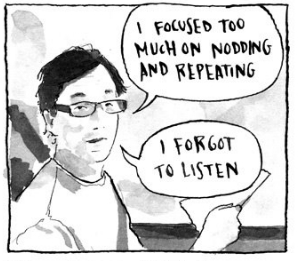 SPURGEON: Were they being complimentary?
SPURGEON: Were they being complimentary?
DECIE: Yes, well, the review was positive, but it's strange having your characters dissected and critiqued when those characters are in fact you and your family. Real people, all be it slightly fictionalized, there for scrutiny. Of course this has always been the case, but until this book there weren't quite so many people passing judgment.
SPURGEON: Do you even think about the confessional aspects here, if not for you then for other people in proximity to you?
DECIE: It does make me think about consent. I'd never knowingly paint Steph or Sam in a bad light, and at present they are happy for me to work on comics about our life. But at the same time they didn't ask for this attention. And I've been drawing about Sam his whole life. He's fine with that, he enjoys being the subject of the books but I have to remain very sensitive of how I portray him.
*****
*
Collecting Sticks, Joe Decie, Jonathan Cape, 9781910702734, April/August 2017.
*****
* cover to book
* all art from new book except for the 2008 strip paired with the 10th anniversary question.
* part of a page from the epilogue [below]
*****
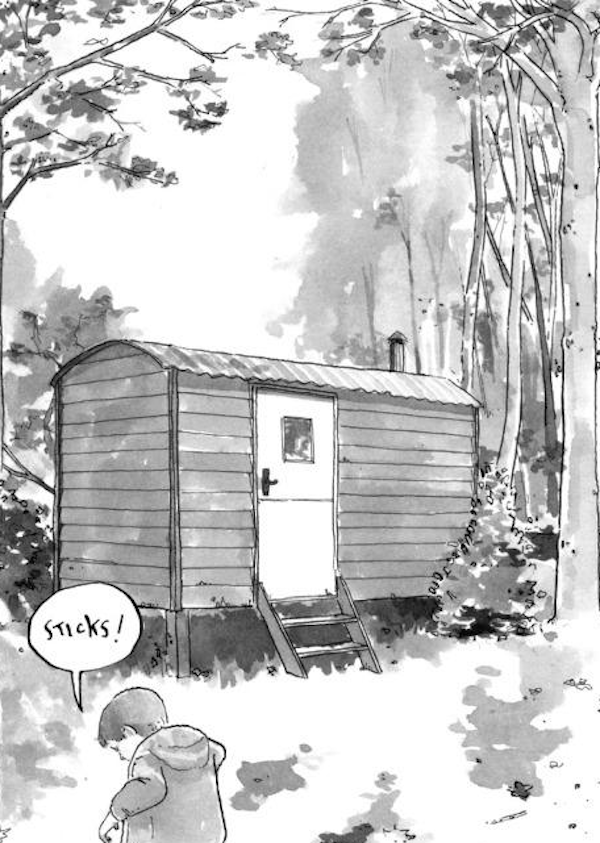
*****
*****


